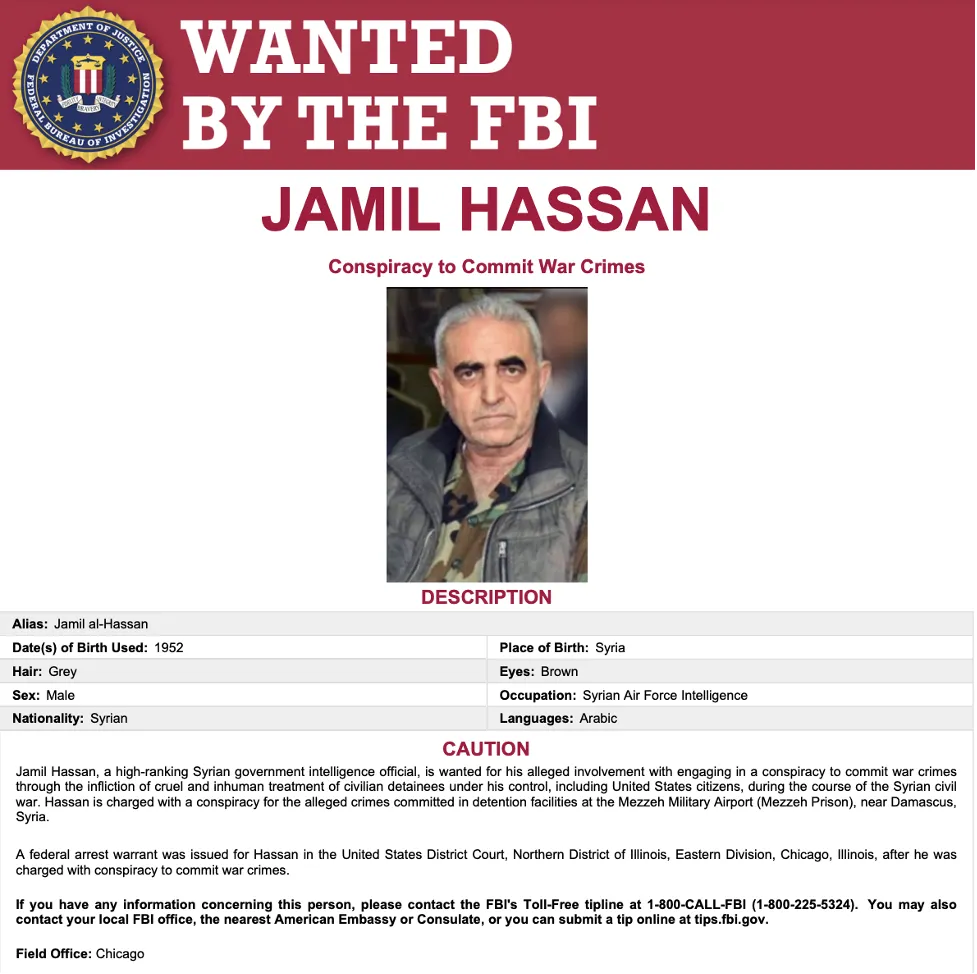Two Former Syrian Intelligence Officers Wanted for War Crimes Against Americans and Syrian Civilians

Jamil Hassan is one of two former Syrian Air Force intelligence officers who have been recently indicted for war crimes by the U.S. Photo provided by FBI.
Jamil Hassan, 72, and Abdul Salam Mahmoud, 65, were charged with engaging in a conspiracy to commit cruel and inhuman treatment of civilian detainees who were held in a Syrian prison during the Syrian civil war. Hassan and Mahmoud are currently at large, and warrants have been issued for their arrest.
If convicted, the two former military officers face life in prison.
Atrocities at Mezzah Prison
Syrian civilians, as well as American and other international citizens, were subjected to numerous atrocities while held in the Mezzeh Military Airport (Mezzeh Prison) outside of Damascus, Syria, say prosecutors.
One of four Syrian Intelligence Agencies, the Syrian Air Force Intelligence (SAFI) worked closely with President Assad of Syria to “identify, surveil, detain, physically and mentally abuse, kill, and repress Syrian civilians and others…,” according to the indictment.
As the Director of Syrian Air Force Intelligence, Hassan oversaw multiple detention facilities, including Mezzeh Prison. Mahmoud was a Brigadier General and was responsible for directing operations at Mezzeh Prison.
“Hassan and Mahmoud allegedly oversaw the systematic use of cruel and inhumane treatment on perceived enemies of the Syrian regime, including American citizens,” FBI Director Christopher Wray said in a press release.

Atrocities Included Beatings and Torture
Between January 2012 and July 2019, detainees under their custody were beaten, electrocuted, hung from ceilings by their wrists, burned with acid, and exposed to countless other physical and mental abuses. Prisoners were forced to listen to other detainees being tortured and forced to share quarters with the bodies of deceased detainees, according to the press release.
Witness 24
The European Center for Constitutional and Human Rights (ECCHR) has detailed specific atrocities as experienced and witnessed by some of the detainees of Mezzeh Prison. One detainee, known as Witness 24 (W24), describes their personal account of what he experienced inside the infamous prison, as detailed in the ECCHR report. W24 was an activist and participated in the early protest movement against the government of Assad. In November 2011, W24 was arrested along with three friends for “political activism, taking part in demonstrations and providing humanitarian assistance to fellow Syrians.”

He spent a total of four and a half months in prisons under the control of the Syrian Air Force Intelligence, during which he was repeatedly tortured, sometimes up to 10 hours a day. When he first arrived, he was tortured for hours with cables and wooden poles with nails attached. As a result, his jaw was broken, and he could not eat for weeks. He was only able to survive with the help of other detainees who would pre-chew his food for him. W24 was also regularly tortured by a method known as “shabeh,” in which his hands were tied from behind, and he was suspended from the ceiling by his wrists, according to the report.
Psychological Torture
Psychological torture was also a large part of what took place inside Mezzeh prison, say prosecutors and human rights groups. Detainees were routinely subjected to threats of death, abuse, and rape, but those threats did not stop with them. SAFI would also threaten to detain, sexually assault, abuse or even kill members of the detainees’ families, according to the indictment. Family members of victims were also detained and threatened to coerce false confessions. Hassan and Mahmoud essentially created an “atmosphere of terror” inside Mezzeh prison.
Discover More Muck
Induced Into Harm: When Doctors and Hospitals Betray Mother and Child
Feature Raymond L. Daye | Jun 11, 2025

Weekly Muck
Join the mission and subscribe to our newsletter. In exchange, we promise to fight for justice.
Weekly
Muck
Join the mission and subscribe to our newsletter. In exchange, we promise to fight for justice.





